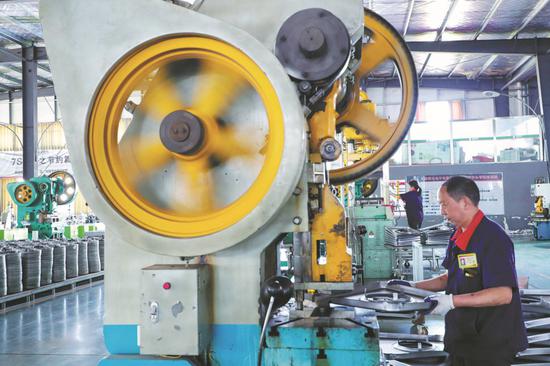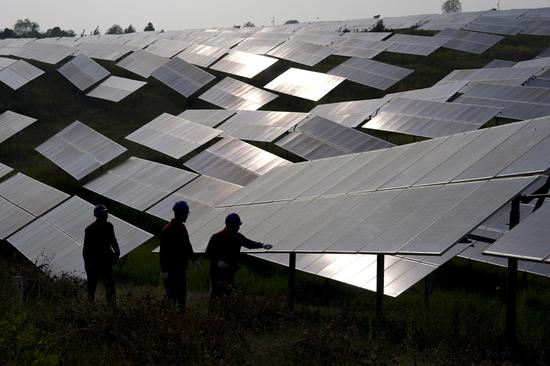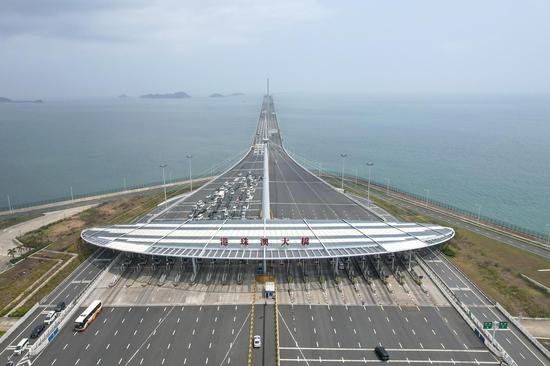
Employees work on an optoelectronics production line in Xinyang, Henan province. (XIE WANBAI/FOR CHINA DAILY)
China's factory activity shrank for the first time in three months while the services sector expanded at a faster pace in May, pointing to a mixed picture amid uneven recovery among sectors, analysts said.
The latest economic indicators point to an unbalanced recovery with the supply side stronger than the demand side, and the economy still faces challenges from the moderation in private consumption and the potential deceleration across housing activity, they said.
Despite the pressures and difficulties ahead, the economic recovery will still be on track in the following months, driven by a ramp-up in fiscal stimulus, more monetary easing and further moves to tackle structural issues, they said.
Their comments came as data from the National Bureau of Statistics showed on Friday that China's official purchasing managers index for the manufacturing sector stood at 49.5 in May versus 50.4 in April, below the 50-point mark that separates growth from contraction.
Zhou Maohua, a researcher at China Everbright Bank, said the manufacturing activity shrank in May due to the impact of the May Day holiday, while China's nonmanufacturing activity remained in the expansionary territory amid improvement in the services sector.
China's services PMI grew to 50.5 in May from 50.3 in April. The country's official composite PMI, which includes both manufacturing and nonmanufacturing activities, dropped from 51.7 in April to 51 in May, the NBS said.
"The latest data point to a biased recovery with the supply side stronger than the demand side," Zhou said. "More efforts should be made to spur consumption and expand domestic demand. The focus should be placed on speeding up the implementation of key projects and better implementing the announced property easing policies in accordance with various cities' local conditions."
Robin Xing, chief China economist at Morgan Stanley, said China has made incremental progress in containing the risk of a debt-deflation loop, including a push for a faster budget rollout and increasing efforts to support housing inventory digestion.
"We expect the augmented fiscal deficit to widen by 0.5 percentage point of GDP in both 2024 and 2025, though the focus may gradually shift from manufacturing upgrades this year to housing stabilization next year," he said. "Meanwhile, there could be a 25 — to 50-basis-point reserve requirement ratio cut in the next couple of months to facilitate government bond issuance, followed by a 20-basis-point policy rate cut in the second half of the year."
Stephen Roach, senior research scholar of the Paul Tsai China Center at Yale Law School, said: "China's recent initiatives (to deal with the property downturn) are steps in the right direction. The property sector package has the right focus aimed at absorbing the inventory overhang of unsold housing units."
Roach, who is also the former chairman of Morgan Stanley Asia and the firm's former chief economist, said the "funding support as announced by the People's Bank of China (the country's central bank) is too small".
"It's going in the right direction, but it needs far more funding support to really make a major dent in the overhang of unsold housing units."
Looking ahead, he said policies need to be formulated more explicitly and more comprehensively to address the shortfall of domestic demand, especially in boosting social consumption in China. "Without the Chinese consumer, I think economic growth is going to remain a big question mark in the years ahead."
Roach told a dialogue held by the Center for China and Globalization on Friday that while China's contribution to global economic growth is slowing, the country remains the most powerful engine in the world.
He said it is advisable for the government to inject much more funding into the social safety net, healthcare and retirement.
"I think that is the biggest impediment to discretionary consumption because it keeps families who are aging rapidly predisposed toward precautionary saving in providing for the future," he said.


















































 京公网安备 11010202009201号
京公网安备 11010202009201号